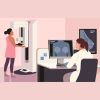New Stanford-led research finds that about 1 in 40 postmenopausal women with breast cancer are as likely as Ashkenazi Jewish women to carry inherited breast-cancer mutations in their BRCA1 or BRCA2 genes.
The study published in JAMA is the first to suggest that women newly-diagnosed with breast cancer before age 65, but who don't have any hereditary risk factors – eg, close family members who have had breast cancer – may still benefit from genetic testing for inherited cancer-associated mutations.
You might also like:From Breast Cancer Diagnosis to Treatment Plan in the Same Place, Same Team, Same Day
At present, most guidelines don't address testing postmenopausal women with breast cancer in the absence of other risk factors. As noted in the study, inherited cancer-associated mutations, particularly in the BRCA1 and BRCA2 genes, may substantially increase the risk of other cancers, including ovarian cancer. Since these mutations are passed through families, knowing that a woman carries one of these mutations may encourage her healthy relatives to discuss their own risk factors with their doctors.
The JAMA study utilised data of more than 4,500 participants in the Women's Health Initiative, the largest study of postmenopausal health in the United States conducted from 1993 to 1998. The current study aimed to determine the prevalence of cancer-associated mutations in 10 breast-cancer risk genes, including BRCA1 and BRCA2.
The research team, led by Allison Kurian, MD, MSc, associate professor of medicine and of epidemiology and population health at Stanford, compared 2,195 women who were diagnosed with breast cancer at an average age of 73 with 2,322 women without breast cancer.
Dr Kurian and colleagues reported these key findings:
- Some 3.5% of the women with breast cancer had a cancer-associated
mutation in at least one of the 10 genes, compared with about 1.3% of women
without cancer.
- Focusing on BRCA1 and
BRCA2 genes, about 2.2% of women with breast cancers had cancer-associated
mutations, versus about 1.1% of those without breast cancer.
According to the Stanford team, only about 31% of those women with cancer and 20% of those without cancer, both with BRCA1 or BRCA2 mutations, were likely to have been recommended for testing under the current guidelines of the National Comprehensive Cancer Network.
"Now we know that the prevalence of cancer-associated BRCA1 and BRCA2 mutations in women diagnosed with breast cancer after menopause rivals that in women of Ashkenazi Jewish descent – a population that is currently encouraged to discuss genetic testing with their doctors," Dr Kurian explained. "We finally have a read on the likely benefit of testing this most common subgroup of breast cancer patients."
Source: Stanford School of Medicine
Image credit: Pixabay



























